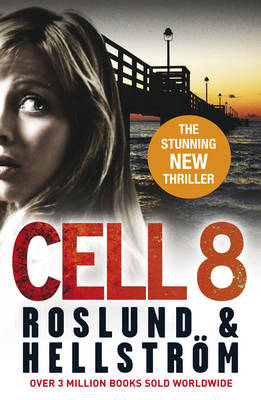
EURO CRIME
Reviews

Roslund and Hellstrom - 'Cell 8' (translated by Kari Dickson)
Hardback: 384 pages (Sep. 2011) Publisher: Quercus Publishing Plc ISBN: 184916147X
CELL 8 is part of the series about Swedish cop Ewert Grens and his colleagues, falling chronologically after BOX 21 (aka THE VAULT) and before THREE SECONDS, winner of the 2011 CWA International Dagger award. CELL 8 begins with a mystery that is soon, from the reader's point of view, resolved. John Meyer Frey is on death row in Ohio for killing his 16-year-old girlfriend. Frey was only 17 when charged and convicted. All appeals exhausted, he dies before he can be executed.
Years later there is a violent incident on a Swedish ferry when a musician playing in a band kicks a dancer in the face for groping a woman passenger. After the boat docks, the injured man staggers to the police station to report the incident, only to pass out on a chair. Grens, on his way in to work, happens to notice him – because of his personal history he recognises the symptoms of incipient brain damage, gets the man rushed into hospital, and soon has the perpetrator in custody.
The identity of the prisoner, not a secret to the reader, is gradually revealed to Grens and colleagues as they realise his passport is a fake and seek information via Interpol and other agencies as to his identity. The US authorities step in, while the man's wife and child beg for his release - by this time the Swedish government is also involved. In parallel, Grens, a wrecked hulk who is barely functional throughout this book (it's hard to imagine how he clings on to his job as a senior policeman), desperately yearns for Anni, his paraplegic ex-colleague and lover, to recover.
CELL 8 lacks any sense of suspense, turning out to be a 360-degree view of all the cons of the death penalty, using this particular case as an example. (In this sense, it is very similar to John Grisham's 1994 novel THE CHAMBER.) In making the accused man an unpleasant character, the authors avoid the easy way to engage the reader's sympathy. The father of the dead girl pushes forward relentlessly his agenda of revenge, ruining his marriage in the process. Again, the authors do not portray him sympathetically, instead showing him as a mean, underhand and erratic monomaniac.
Some of the actions and events that the authors use to pursue their desired plot-line and agenda are barely realistic, often relying on coincidences. At the same time, Grens and colleagues are not able to do any actual detection, or really anything very much after they have arrested their suspect, as senior figures in Sweden and elsewhere take control of events.
CELL 8 written in very simple language, with many paragraphs taking the form of a few words, and every (short) chapter ending on a "cliffhanger", followed by several flashbacks to show us how this point was reached. Although the book is easy to read in terms of writing style, it is not one that I enjoyed very much, mainly because the authors are too obviously using their story to hammer home their polemical views about capital punishment. The "twist" is not one that I'd anticipated (I had a different theory that turned out to be incorrect), but it isn't one that I think remotely plausible; indeed its very implausibility undermines the point the authors are trying to make about the strength of the evidence that can send a person to death row, and therefore dilutes the impact of their diatribe against capital punishment. Although I personally did not enjoy the book all that much, it's a quick-fire read that I imagine will appeal to plenty of people who like tough, political thrillers.
Maxine Clarke, England
December 2011
Details of the author's other books with links to reviews can be found on the Books page.
More European crime fiction reviews can be found on the Reviews page.